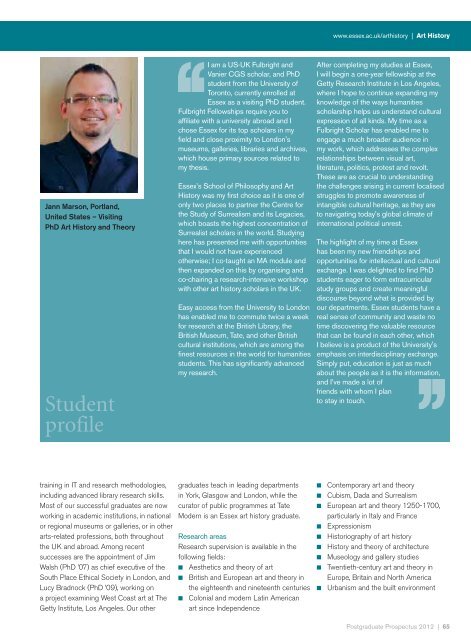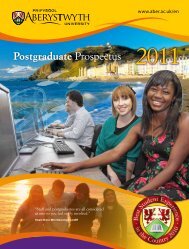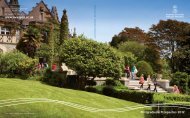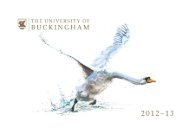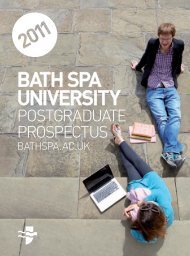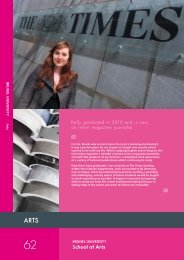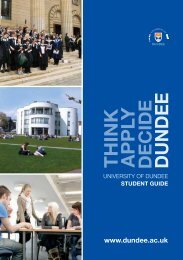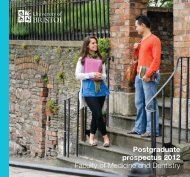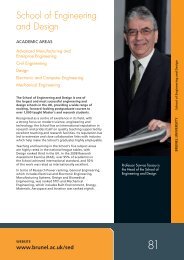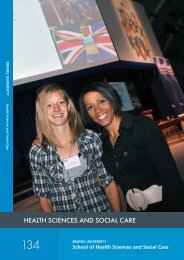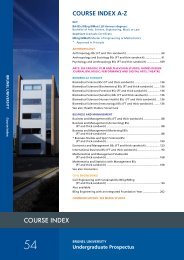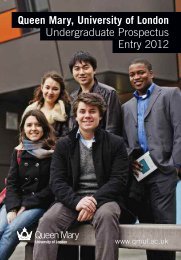Postgraduate Prospectus
Postgraduate Prospectus
Postgraduate Prospectus
You also want an ePaper? Increase the reach of your titles
YUMPU automatically turns print PDFs into web optimized ePapers that Google loves.
www.essex.ac.uk/arthistory | Art History<br />
Jann Marson, Portland,<br />
United States – Visiting<br />
PhD Art History and Theory<br />
Student<br />
profile<br />
I am a US-UK Fulbright and<br />
Vanier CGS scholar, and PhD<br />
student from the University of<br />
Toronto, currently enrolled at<br />
Essex as a visiting PhD student.<br />
Fulbright Fellowships require you to<br />
affiliate with a university abroad and I<br />
chose Essex for its top scholars in my<br />
field and close proximity to London's<br />
museums, galleries, libraries and archives,<br />
which house primary sources related to<br />
my thesis.<br />
Essex’s School of Philosophy and Art<br />
History was my first choice as it is one of<br />
only two places to partner the Centre for<br />
the Study of Surrealism and its Legacies,<br />
which boasts the highest concentration of<br />
Surrealist scholars in the world. Studying<br />
here has presented me with opportunities<br />
that I would not have experienced<br />
otherwise; I co-taught an MA module and<br />
then expanded on this by organising and<br />
co-chairing a research-intensive workshop<br />
with other art history scholars in the UK.<br />
Easy access from the University to London<br />
has enabled me to commute twice a week<br />
for research at the British Library, the<br />
British Museum, Tate, and other British<br />
cultural institutions, which are among the<br />
finest resources in the world for humanities<br />
students. This has significantly advanced<br />
my research.<br />
After completing my studies at Essex,<br />
I will begin a one-year fellowship at the<br />
Getty Research Institute in Los Angeles,<br />
where I hope to continue expanding my<br />
knowledge of the ways humanities<br />
scholarship helps us understand cultural<br />
expression of all kinds. My time as a<br />
Fulbright Scholar has enabled me to<br />
engage a much broader audience in<br />
my work, which addresses the complex<br />
relationships between visual art,<br />
literature, politics, protest and revolt.<br />
These are as crucial to understanding<br />
the challenges arising in current localised<br />
struggles to promote awareness of<br />
intangible cultural heritage, as they are<br />
to navigating today's global climate of<br />
international political unrest.<br />
The highlight of my time at Essex<br />
has been my new friendships and<br />
opportunities for intellectual and cultural<br />
exchange. I was delighted to find PhD<br />
students eager to form extracurricular<br />
study groups and create meaningful<br />
discourse beyond what is provided by<br />
our departments. Essex students have a<br />
real sense of community and waste no<br />
time discovering the valuable resource<br />
that can be found in each other, which<br />
I believe is a product of the University's<br />
emphasis on interdisciplinary exchange.<br />
Simply put, education is just as much<br />
about the people as it is the information,<br />
and I’ve made a lot of<br />
friends with whom I plan<br />
to stay in touch.<br />
training in IT and research methodologies,<br />
including advanced library research skills.<br />
Most of our successful graduates are now<br />
working in academic institutions, in national<br />
or regional museums or galleries, or in other<br />
arts-related professions, both throughout<br />
the UK and abroad. Among recent<br />
successes are the appointment of Jim<br />
Walsh (PhD ’07) as chief executive of the<br />
South Place Ethical Society in London, and<br />
Lucy Bradnock (PhD ’09), working on<br />
a project examining West Coast art at The<br />
Getty Institute, Los Angeles. Our other<br />
graduates teach in leading departments<br />
in York, Glasgow and London, while the<br />
curator of public programmes at Tate<br />
Modern is an Essex art history graduate.<br />
Research areas<br />
Research supervision is available in the<br />
following fields:<br />
n Aesthetics and theory of art<br />
n British and European art and theory in<br />
the eighteenth and nineteenth centuries<br />
n Colonial and modern Latin American<br />
art since Independence<br />
n Contemporary art and theory<br />
n Cubism, Dada and Surrealism<br />
n European art and theory 1250-1700,<br />
particularly in Italy and France<br />
n Expressionism<br />
n Historiography of art history<br />
n History and theory of architecture<br />
n Museology and gallery studies<br />
n Twentieth-century art and theory in<br />
Europe, Britain and North America<br />
n Urbanism and the built environment<br />
<strong>Postgraduate</strong> <strong>Prospectus</strong> 2012 | 65


